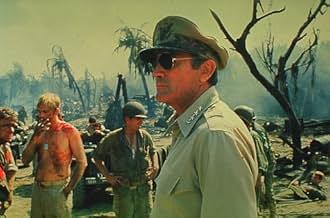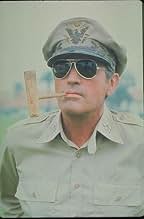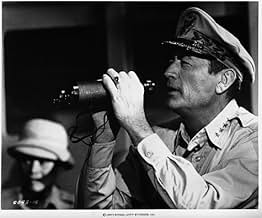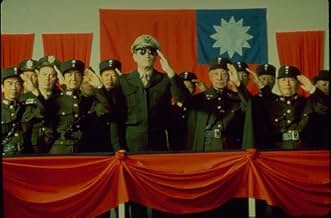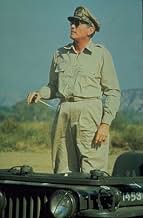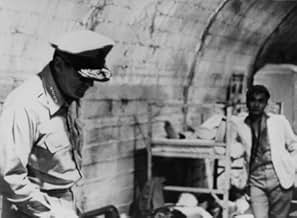Il generale MacArthur, una figura carismatica e allo stesso tempo complessa, dai trionfi alle sconfitte della sua brillante carriera dal 1942, nelle Filippine, al 1951 fino al suo ritorno al... Leggi tuttoIl generale MacArthur, una figura carismatica e allo stesso tempo complessa, dai trionfi alle sconfitte della sua brillante carriera dal 1942, nelle Filippine, al 1951 fino al suo ritorno alla guerra, in Corea che portò al suo allontanamento dall'esercito.Il generale MacArthur, una figura carismatica e allo stesso tempo complessa, dai trionfi alle sconfitte della sua brillante carriera dal 1942, nelle Filippine, al 1951 fino al suo ritorno alla guerra, in Corea che portò al suo allontanamento dall'esercito.
- Premi
- 2 candidature totali
- Admiral King
- (as Russell D. Johnson)
Recensioni in evidenza
George S. Patton commanded an Army formation in Europe while Douglas Macarthur commanded an entire theater of operation in the Pacific. By his own admission, Patton never had any political ambitions, while MacArthur definitely had such aspirations. Patton's political naivety made him ill-suited as the postwar occupation commander in Bavaria while MacArthur's political astuteness served him well during the occupation of Japan.
Yet both men were great, if iconoclastic military leaders. Patton's brilliant northern pivot during the Battle of the Bulge is matched by the MacArthur's daring amphibious landing at Inchon. And both men believed strongly in their destiny; Patton's belief was based on reincarnation while MacArthur was motivated by following in his illustrious father's footsteps.
Surprisingly, PATTON is the much more succinct, less ambitious film than MACARTHUR. It concentrates on its colorful, mercurial main character during a comparatively brief two-year period between the American defeat at Kasserine Pass in early 1943 to Patton's dismissal prior to his death in late 1945. Although we see Patton's conflict with Omar Bradley, Bernard Montgomery, and Bedell Smith, we never see his interaction with General Dwight Eisenhower, Prime Minister Winston Churchill, or General George Marshall, the U.S. Army's chief of staff.
MACARTHUR is a much more ambitious film, covering nearly a decade from the fall of Bataan in early 1942 to MacArthur's dismissal in 1951. Additionally, MACARTHUR shows a wider range of conflict between MacArthur and such individuals as Admiral Nimitz, General Marshall, ambassador William Averell Harriman, and Presidents Roosevelt and Harry S. Truman.
So, does MACARTHUR match PATTON as a groundbreaking biopic? No, it doesn't.
MACARTHUR lacks the insightful, acerbic screenplay that Francis Ford Coppola and Edmund North supplied PATTON. The direction by TV veteran Joseph Sargent is yeoman-like where the late Franklin J. Schaffner offers a more vigorous, hell-for-leather approach to PATTON. Both films are handsomely mounted productions that serve as a tribute to acumen of the producer McCarthy. Both movies benefit from film scores by the ever-reliable Jerry Goldsmith.
While PATTON has its main character departing in a Valhalla-like denouement, MACARTHUR is book-ended by the legendary speech that the old soldier delivered to the cadet corps at West Point in 1962 as a final valedictory.
At the heart of both films are the extraordinary performances of their lead actors. The late George C. Scott's portrayal of Patton is justly remembered, but Gregory Peck delivers a performance that is both subtle and unapologetic and helps to elevate this often-pedestrian production to a higher level. Peck's portrayal is reminiscent of his work in TWELVE O'CLOCK HIGH, but with the added weight of an additional thirty years of experience and craftsmanship that this great actor brings to bear to this role. Peck is ably supported by Dan O'Herlihy as FDR and the late Ed Flanders as Harry S. Truman.
Finally, I must note the presence of Dr. D. Clayton James, the author of the standard multi-volume biography of MacArthur, who served as this film's technical advisor.
MacArthur's conviction that war is a great evil is convincingly portrayed, as is the relish of a general doing the only thing for which he was trained: the prosecution of war to the utmost severity.
The real heroes of this movie are the politicians. Not just Roosevelt, but also the caricature of Truman, and the never seen or heard Eisenhower (a good clerk according to Peck's MacArthur). This movie reminded me that it is as important for a politician to compromise as for it is a general to combat.
MacArthur's greatest opportunity was to become military ruler of a defeated Japan, for 3 years. It appears that he seized this to some good effect. He later claimed that:
"The Japanese people since the war have undergone the greatest reformation recorded in modern history. With a commendable will, eagerness to learn, and marked capacity to understand, they have from the ashes left in war's wake erected in Japan an edifice dedicated to the supremacy of individual liberty and personal dignity, and in the ensuing process there has been created a truly representative government committed to the advance of political morality, freedom of economic enterprise, and social justice."
In this one seems to hear the tone of a general boasting about his troops. That is no small thing: for a fighter to impose a peace, on more or less unconditional terms, and seek to reconstitute, rather than to humiliate. He would have made an abominably bad politician, but as interim ruler he ain't done so bad, according to this thoughtful movie.
7/10 for movie making; 8/10 for thought provocation.
David Broadhurst
But all in all, I think this is a remarkably balanced look at an extremely controversial person. For those who know little about MacArthur, it's a good place to start. He was a larger-than-life figure, and in this film you can see both why he was revered and why he was despised.
Although MacArthur came of age in the 19th century and became a general in World War I, this movie focuses on his high and lows in World War II and the Korean War. During that time he was an iconic figure. "Iconic" is an overused word, but it applies to him. With his trademark hat and corncob pipe, plus his curiously old-fashioned way of speaking and his instinct for controversy, he was unmistakable and larger than life.
During the late 1970s, the post-Watergate era, traditional war pictures were no longer in vogue. "M*A*S*H," the mildly pacifist TV series set in the Korean War, treated MacArthur as a rather silly figure. But this movie, made in 1977, takes the man seriously, while showing his flaws clearly. It also is more frank than most classic films about how little consensus there is in warmaking. Leaders quarrel and connive while making policy, and the most loyal grunts are often dismayed at the decisions that put them in harm's way.
Gregory Peck is excellent in capturing the complexity of Douglas MacArthur. Peck was an outspoken political liberal, and one has to assume he was no admirer of the unabashedly right-wing MacArthur. But he takes on the man's persona admirably.
After heaping so much praise on "MacArthur," I must admit it is not great cinema. It's more interesting than moving. But if you're under 50 and know Douglas MacArthur only as a name in the history books, this will be an eye-opener. Like any good introduction to a subject, it should encourage you to seek other information and form your own opinions about the man and his times.
One difference between the two films is that `Patton' is more focused, concentrating on a relatively short period at and immediately after the end of the Second World War, whereas `MacArthur' covers not only this war but also its subject's role in the Korean war, as well as his period as American governor of occupied Japan during the interlude.
The main difference, however, lies in the way the two leaders are played. Gregory Peck dominates this film even more than George C. Scott dominated `Patton'. Whereas Scott had another major star, Karl Malden, playing opposite him as General Bradley, none of the other actors in `MacArthur' are household names, at least for their film work. Scott, of course, portrayed Patton as aggressive and fiery-tempered, a man who at times was at war with the rest of the human race, not just with the enemy. I suspect that in real life General MacArthur was as volcanic an individual as Patton, but that is not how he appears in this film. Peck's MacArthur is of a more reflective, thoughtful bent, comparable to the liberal intellectuals he played in some of his other films. At times, he even seems to be a man of the political left. Much of his speech on the occasion of the Japanese surrender in 1945 could have been written by a paid-up member of CND, and his policies for reforming Japanese society during the American occupation have a semi-socialist air to them. In an attempt to show something of MacArthur's gift for inspiring leadership, Peck makes him a fine speaker, but his speeches always seem to owe more to the studied tricks of the practised rhetorician than to any fire in the heart. It is as if Atticus Finch from `To Kill a Mockingbird' had put on a general's uniform.
Whereas Scott attempted a `warts and all' portrait of Patton, the criticism has been made that `MacArthur' attempts to gloss over some of its subject's less attractive qualities. I think that this criticism is a fair one, particularly as far as the Korean War is concerned. The film gives the impression that MacArthur was a brilliant general who dared stand up to interfering, militarily ignorant politicians who did not know how to fight the war and was sacked for his pains when victory was within his grasp. Many historians, of course, feel that Truman was forced to sack MacArthur because the latter's conduct was becoming a risk to world peace, and had no choice but to accept a stalemate because Stalin would not have allowed his Chinese allies to be humiliated. Even during the Korean scenes, Peck's MacArthur comes across as more idealistic than his real-life original probably was; we see little of his rashness and naivety about political matters. (Truman 's remark `he knows as much about politics as a pig knows about Sunday' was said about Eisenhower, but it could equally well have been applied to MacArthur's approach to international diplomacy). Perhaps the film's attempt to paint out some of MacArthur's warts reflects the period in which it was made. The late seventies, after the twin traumas of Vietnam and Watergate, was a difficult time for America, and a public looking for reassurance might have welcomed a reassuringly heroic depiction of a military figure from the previous generation. Another criticism I would make of the film is that it falls between two stools. If it was intended to be a full biography of MacArthur, something should have been shown of his early life, which is not covered at all. (The first we see of the general is when he is leading the American resistance to the Japanese invasion of the Philippines). One theme that runs throughout the film is the influence of General MacArthur's father, himself a military hero. I would have liked to see what sort of man Arthur MacArthur was, and just why his son considered him to be such a hero and role model. Another interesting way of making the film would have been to concentrate on Korea and on MacArthur's clash with Truman, with equal prominence given to the two men and with actors of similar stature playing them. The way in which the film actually was made seemed to me to be less interesting than either of these alternative approaches.
It would be wrong, however, to give the impression that I disliked the film altogether. Although I may not have agreed with Peck's interpretation of the main role, there is no denying that he played it with his normal professionalism and seriousness. The film as a whole is a good example of a solid, workmanlike biopic, thoughtful and informative. It is a good film, but one that could have been a better one. 7/10.
On a pedantic note, the map which MacArthur is shown using during the Korean War shows the DMZ, the boundary between the two Korean states that did not come into existence until after the war. (The pre-war boundary was the 38th parallel). Also, I think that MacArthur was referring to the `tocsin' of war. War may be toxic, but it is difficult to listen with thirsty ear for a toxin.
Agreeable biopic about the famed general concerning the latter years of his long military career , it starts with his assumption of command of the Philippine army and subsequent retreat ; going on through Inchon landing , China invasion on Korea crossing over parallel 39 and his sacking by President Harry Truman . This is a pretty good film with plenty of emotion , drama , biographic elements , historical events and Peck is spellbinding in the title role . The flick describes efficiently his particular character , complexity and the controversy that surrounded him . Very fine acting by the great Gregory Peck as military chief , he even bears remarkable resemblance to Douglas MacArthur , he had some of his hair shaved off since the real General was quite bald . Peck' outstanding acting arranges to bring alive this historical role , who strode a fine line between demigod and expert battlefield commander . Originally made for TV , it has a long runtime , at 144 minutes , being cut for cinema release . The picture gets magnificent interpretations from prestigious secondaries playing Generals and historical roles such as Kenneth Tobey (Adm. William 'Bull' Halsey) , Gen. George C. Marshall (Ward Costello) , Addison Powell (Fleet Adm. Chester W. Nimitz) , Dick O'Neill (Col. Courtney Whitney) , and Presidents as Dan O'Herlihy (Franklin D Roosevel) , Ed Flanders (Harry Truman) , and John Fujioka (Emperor Hirohito) . This is an engaging warlike drama made at the better for its historic resonance and will appeal to Gregory Peck fans.
Well produced by Frank McCarthy who also financed other warfare movies such as ¨Decision before dawn¨, ¨Single-Handed¨, ¨Fireball Forward¨ and ¨Patton¨ . This solid motion picture was professionally directed by Joseph Sargent , though it holds a certain television style . Sargent is an expert on biography and specialist on historical narrations , as he proved in 'Mandela and Clerk' , 'Abraham , 'McArthur' , 'When the lions roared' which reunited to Stalin , Churchill and again Roosevelt , 'Day one' with Oppenheimer and General General Groves and 'Warm Springs' about Franklin D Roosevelt ; these films don't pack the punch that he achieved in his best movie resulting to be 'Taking of Pelham one , two , three' .
And adding more biographical elements about this military hero : MacArthur was recalled to active duty in 1941 as commander of United States Army Forces in the Far East. A series of disasters followed, starting with the destruction of his air forces on 8 December 1941, and the invasion of the Philippines by the Japanese. MacArthur's forces were soon compelled to withdraw to Bataan, where they held out until May 1942. In March 1942, MacArthur, his family and his staff left nearby Corregidor Island in PT boats and escaped to Australia, where MacArthur became Supreme Commander, Southwest Pacific Area. And General Douglas MacArthur pronounces his famous line : "I will return" . For his defense of the Philippines, MacArthur was awarded the Medal of Honor. After more than two years of fighting in the Pacific, he fulfilled a promise to return to the Philippines. He officially accepted Japan's surrender on 2 September 1945, aboard the USS Missouri anchored in Tokyo Bay, and oversaw the occupation of Japan from 1945 to 1951. As the effective ruler of Japan, he oversaw sweeping economic, political and social changes. He led the United Nations Command in the Korean War until he was removed from command by President Harry S. Truman on 11 April 1951. He later became Chairman of the Board of Remington Rand.
Lo sapevi?
- QuizAlthough Gregory Peck had reservations about the film's script and production quality, he later called it one of his favorite roles, if not one of his favorite movies.
- BlooperShortly after MacArthur's escape from the Philippines in the spring of 1942, he complains that the President and the Chiefs of Staff are not sending him enough troops, supplies, and equipment to carry on his war against the Japanese. He says that priorities are instead being given to commanders in other theaters, including Gen Patton in North Africa. However, Patton's troops did not arrive in Africa until November 1942.
- Citazioni
President Sergio Osmena: You see, General, my people are going to laugh if I fell in deep water. I cannot swim!
General Douglas MacArthur: That's not so bad, Mr. President. Everyone's about to see that I can't walk on water.
- Versioni alternativeThe UK DVD issue omits the sequence where MacArthur meets Emperor Hirohito, but instead, adds to the ending. The film now ends with MacArthur and his wife watch a TV transmission of the presidential inauguration of Eisenhower MacArthur's comment: "He will turn out fine. He was the best clerk that ever served under me"), followed by the end of MacArthur's farewell speech at West Point. The subsequent credits starts to roll slightly earlier than previously.
I più visti
- How long is MacArthur?Powered by Alexa
Dettagli
Botteghino
- Budget
- 9.000.000 USD (previsto)
- Tempo di esecuzione
- 2h 10min(130 min)
- Mix di suoni
- Proporzioni
- 1.85 : 1

